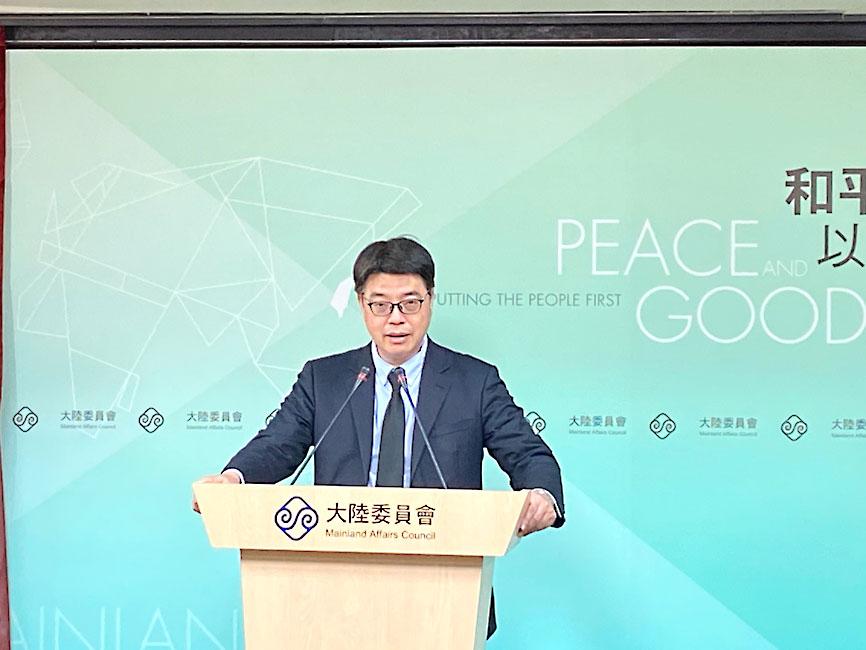China is to ban its students from applying to study in Taiwan’s schools in the semester beginning in September, citing the COVID-19 pandemic and cross-strait relations, the Chinese Ministry of Education said in a statement yesterday.
Chinese students currently enrolled in Taiwanese universities can apply to remain there, it said.
The policy regarding the admission of Taiwanese students to universities in China remains unchanged, it added.

Photo: Chung Li-hua, Taipei Times
“The pressing matters at hand include how to address the current obstacles that Chinese students [enrolled in universities in Taiwan] face in returning to the schools to study. It is important to safeguard their legitimate rights,” it said, referring to the Ministry of Education’s Feb. 3 decision to stop Chinese students from returning to Taiwanese universities after the winter break to contain the viral outbreak.
To ensure the education rights of Chinese students, the ministry offered other learning resources, such as online courses, as alternatives.
During a regular news briefing yesterday, Mainland Affairs Council spokesman Chiu Chui-cheng (邱垂正) said it regrets that China has unilaterally halted Chinese students from studying in Taiwan.
Since Taiwan’s government allowed Chinese students to study in Taiwan from 2011, it has not altered its policy of welcoming Chinese students, he said.
Nearly 8,000 Chinese students have enrolled in Taiwan’s schools, although only 800 are currently in Taiwan, he said.
Universities in Taiwan this month would normally begin accepting applications from Chinese students, and publish the results no later than July, so that they would have ample time to prepare to come to Taiwan before September, University Entrance Committee for Mainland Chinese Students secretary-general Chang Hong-de (張鴻德) said.
The committee and its Chinese counterpart were not aware of the new policy until yesterday, Chang said, adding that the announcement came abruptly.
The committee requested that its counterpart confirm details with the Chinese government, such as how the restrictions apply, so it can better respond to the situation, he said.
Last year, 3,800 Chinese students were admitted to Taiwanese universities, including 800 high-school graduates, 1,500 university graduates and 1,500 graduates from junior college programs, Chang said.
About 40 percent of the Chinese students that apply to graduate schools in Taiwan are already in Taiwan studying for a bachelor’s degree, he said.
It is still difficult to estimate how the new restrictions would affect Taiwan, he added.

AIR SUPPORT: The Ministry of National Defense thanked the US for the delivery, adding that it was an indicator of the White House’s commitment to the Taiwan Relations Act Deputy Minister of National Defense Po Horng-huei (柏鴻輝) and Representative to the US Alexander Yui on Friday attended a delivery ceremony for the first of Taiwan’s long-awaited 66 F-16C/D Block 70 jets at a Lockheed Martin Corp factory in Greenville, South Carolina. “We are so proud to be the global home of the F-16 and to support Taiwan’s air defense capabilities,” US Representative William Timmons wrote on X, alongside a photograph of Taiwanese and US officials at the event. The F-16C/D Block 70 jets Taiwan ordered have the same capabilities as aircraft that had been upgraded to F-16Vs. The batch of Lockheed Martin

GRIDLOCK: The National Fire Agency’s Special Search and Rescue team is on standby to travel to the countries to help out with the rescue effort A powerful earthquake rocked Myanmar and neighboring Thailand yesterday, killing at least three people in Bangkok and burying dozens when a high-rise building under construction collapsed. Footage shared on social media from Myanmar’s second-largest city showed widespread destruction, raising fears that many were trapped under the rubble or killed. The magnitude 7.7 earthquake, with an epicenter near Mandalay in Myanmar, struck at midday and was followed by a strong magnitude 6.4 aftershock. The extent of death, injury and destruction — especially in Myanmar, which is embroiled in a civil war and where information is tightly controlled at the best of times —

China's military today said it began joint army, navy and rocket force exercises around Taiwan to "serve as a stern warning and powerful deterrent against Taiwanese independence," calling President William Lai (賴清德) a "parasite." The exercises come after Lai called Beijing a "foreign hostile force" last month. More than 10 Chinese military ships approached close to Taiwan's 24 nautical mile (44.4km) contiguous zone this morning and Taiwan sent its own warships to respond, two senior Taiwanese officials said. Taiwan has not yet detected any live fire by the Chinese military so far, one of the officials said. The drills took place after US Secretary

THUGGISH BEHAVIOR: Encouraging people to report independence supporters is another intimidation tactic that threatens cross-strait peace, the state department said China setting up an online system for reporting “Taiwanese independence” advocates is an “irresponsible and reprehensible” act, a US government spokesperson said on Friday. “China’s call for private individuals to report on alleged ‘persecution or suppression’ by supposed ‘Taiwan independence henchmen and accomplices’ is irresponsible and reprehensible,” an unnamed US Department of State spokesperson told the Central News Agency in an e-mail. The move is part of Beijing’s “intimidation campaign” against Taiwan and its supporters, and is “threatening free speech around the world, destabilizing the Indo-Pacific region, and deliberately eroding the cross-strait status quo,” the spokesperson said. The Chinese Communist Party’s “threats